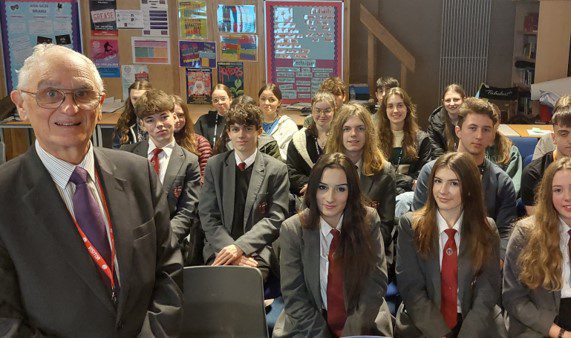might need help in monitoring treatment trials or pathologists might want to understand substances and chemicals in their cases. He showed how drugs sold at festivals are very often not what they claim to be, and how his labs have played a role in showing how medicines in many parts of the developing world are made to inconsistent standards.
However, what became clear was that Professor Holt has been a businessman as much as a scientist. He took financial risks in setting up the testing company, and had to work hard to gain customers and develop his business. Recently, sixth form business students have been looking at the difference between innovation, where you create something new, and enterprise, which involves deciding which innovations you think will make money and which will not. Professor Holt was a great example of someone who had done both.
Students asked many questions which helped us understand better how the testing process works and what it is like to use science in practice. Several students said it had made them re-evaluate what they might want to do in the future and had looked up more about Professor Holt’s business and work. The fact that he came all the way from London, just to talk with us, was very much appreciated.
Highfields students from year 11, 12 and 13 listened to him explaining some of the science behind his work. He has worked in laboratory medicine for over 50 years, and a whole host of clients ask his labs to identify substances. The police might be asking for help in forensic work, pharmaceutical companies might need help in monitoring treatment trials or pathologists might want to understand substances and chemicals in their cases. He showed how drugs sold at festivals are very often not what they claim to be, and how his labs have played a role in showing how medicines in many parts of the developing world are made to inconsistent standards.
However, what became clear was that Professor Holt has been a businessman as much as a scientist. He took financial risks in setting up the testing company, and had to work hard to gain customers and develop his business. Recently, sixth form business students have been looking at the difference between innovation, where you create something new, and enterprise, which involves deciding which innovations you think will make money and which will not. Professor Holt was a great example of someone who had done both.
Students asked many questions which helped us understand better how the testing process works and what it is like to use science in practice. Several students said it had made them re-evaluate what they might want to do in the future and had looked up more about Professor Holt’s business and work. The fact that he came all the way from London, just to talk with us, was very much appreciated.


